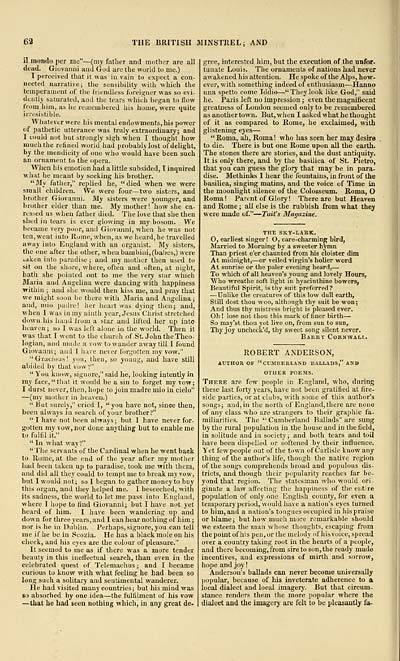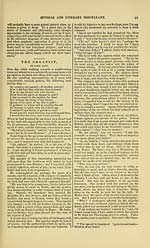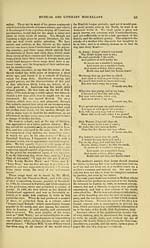Glen Collection of printed music > Printed music > British minstrel, and musical and literary miscellany
(70) Page 62
Download files
Complete book:
Individual page:
Thumbnail gallery: Grid view | List view

63
THE BRITISH MINSTREL; AND
il mondo per mc" — (my father and mother are all
dead. Giovanni and God are the world to me.)
I perceived that it was in vain to expect a con-
nected narrative; the sensihility with which the
temperament of the friendless foreigner was so evi-
dently saturated, and the tears which began to flow
from him, as he reniemhered his home, were quite
irresistible.
Whatever were his mental endowments, his power
of pathetic utterance was truly extraordinary; and
I cimld not but strongly sigh when I thought how
much the refined world" had probably lost of delight,
by the mendicity of one who would have been such
an ornament to the opera.
When his emotion had a little subsided, T inquired
what he meant by seeking his brother.
"My father," replied he, "died when we were
small children. We were four — two sistsrs, and
brother Giovanni. My sisters were younger, and
brother elder than me. My mother ! how she ca-
ressed us when father died. The love that she then
shed in tears is ever gh)wing in my bosom. We
became very poor, and Giovanni, when he was not
ten, went into Rome, when, as we heard, he travelled
away into England with an organist. My sisters,
the one after the other, when bambini, (babes,) were
taken into paradise ; and my motlier then used to
sit on the shore, where, often and often, at night,
liath she pointed out to me the very star which
Maria and Angelina were dancing with happiness
within ; and she would then kiss me, and pray that
we might soon be there with Maria and Angelina ;
and, mio padre! her heart was dying then; and,
when I was iumy nijith year, Jesus" Christ stretched
down his hand from a stai- and lifted her up into
heaven; so I was left alone in the world. Then it
was that I went to the church of St. John the Theo-
logian, and made a vow to wander away till I found
Giovanni; and 1 have never forgotten my vow."
"Gracious! you, then, so young, and have still
abided by that vow?"
" You know, signore," said he, looking intently in
my face, " that it would be a sin to forget my vow;
I durst never, then, hope to join madre mio in cielo"
— (my mother in lieaven.)
" But surely," cried I, "you have not, since then,
been always in search of your brother?"
" I have not been always; but I have never for-
gotten ray vow, nor done anything but to enable me
to fultil it."
" In what way?"
" The servants of the Cardinal when he went back
to Rome, at the end of the year after my mother
had been taken up to paradise, took me with them,
and did all they could to tempt me to break my vow,
but I would not; so I began to gather money to buy
this organ, and they helped me. I beseeched, with
its sadness, the world to let me pass into England,
where I hope to tind Giovanni; but I have not yet
heard of him. I have been wandering up and
down for three years, and I can hear nothing of him ;
nor is he in Dublin. Perhaps, signore, you can tell
me if he be in Scozia. He has a black mole on his
clieek, and his eyes are the colour of pleasure."
It seemed to me as if there was a more tender
beauty in this inefl'eetual search, than even in the
celebrated quest of Telemachus ; and I became
curious to know with what feeling he had been so
long such a solitary and sentimental wanderer.
He had visited many countries; but his mind was
so absorbed by one idea — the fulfilment of his vow
— that he had seen nothing which, in any great de- I
gree, interested him, but the execution of the unfor-
tunate Louis. The ornaments of nations had never
awakened his attention. He spoke of the Alps, how-
ever, with something indeed of enthusiasm — Hanno
una spetto come Iddio — "They look like God," said
he. Paris left no impression ; even the magnificent
greatness of London seemed only to be remembered
as another town. But, when I asked what he thought
of it as compared to Rome, he exclaimed, with
glistening eyes —
" Roma, ah, Roma! who has seen her may desire
to die. There is but one Rome upon all the earth.
The stones there are stories, and the dust antiquity.
It is only there, and by the basilica of St. Pietro,
that you can guess the glory that may be in para-
dise. Methinks I hear the fountains, in front of the
basilica, singing matins, and the voice of Time in
the moonlight silence of the Colosseum. Roma, O
Roma ! Parent of Glory ! There are but Heaven
and Rome ; all else is the rubbish from what they
were made of." — Tait's Mayazine,
THE SKY-LARK.
O, earliest singer! O, care-charmine bird,
Married to Morning by a sweeter hymn
Than priest e'er chaunted from his cloister dim
At midnight, — or veiled virgin's hoUer word
At sunrise or the paler evening heard, —
To which of all heaven's young and lovely Hours,
"Who wreathe soft light in hyacinthine bowers.
Beautiful Spirit, is thy suit preferred?
. — UnUke the creatures of this low dull earth.
Still dost thou woo, although thy suit be won;
And thus thy mistress bright is pleased ever.
Oh ! lose not thou this maj-k of tiner birth —
So may'st thou yet live on, from sun to sun.
Thy joy uneheek'd, thy sweet song silent never.
Barry Cornwall.
ROBERT ANDERSON,
AUTHOR OF "CUMBERLAND BALLADS," AND
OTHER POEMS.
There are few people in England, who, during
these last forty years, have not been gratified at fire-
side parties, or at clubs, with some of this author's
songs; and, in the north of England, there are none
of any class who are strangers to their graphic fa-
miliarities. The " Cumberland Ballads" are sung
by the rural population in the house and in the field,
in solitude and in society; and both tears and toil
have been dispelled or softened by their influence.
Yet few people out of the town of Carlisle know any
thing of the author's life, though the native region
of the songs comprehends broad and populous dis-
tricts, and though their popularity reaches far be-
yond that region. The statesman who would ori-
ginate a law aft'ecting the happiness of the entire
population of only one English county, for even a
temporary period, would have a nation's eyes turned
to him, and a nation's tongues occupied in his praise
or blame; but how much more remarkable should
we esteem the man whose thoughts, escaping from
the point of his pen, or the melody of his voice, spread
over a country taking root in the hearts of a people,
and there becoming, from sire to son, the ready made
incentives, and expressions of mirth and sorrow,
hope and joy !
Anderson's ballads can never become universally
popular, because of his inveterate adherence to a
local dialect and local imagery. But that circimi-
stance renders them the more popular where the
dialect and the imagery are felt to be pleasantly fa-
THE BRITISH MINSTREL; AND
il mondo per mc" — (my father and mother are all
dead. Giovanni and God are the world to me.)
I perceived that it was in vain to expect a con-
nected narrative; the sensihility with which the
temperament of the friendless foreigner was so evi-
dently saturated, and the tears which began to flow
from him, as he reniemhered his home, were quite
irresistible.
Whatever were his mental endowments, his power
of pathetic utterance was truly extraordinary; and
I cimld not but strongly sigh when I thought how
much the refined world" had probably lost of delight,
by the mendicity of one who would have been such
an ornament to the opera.
When his emotion had a little subsided, T inquired
what he meant by seeking his brother.
"My father," replied he, "died when we were
small children. We were four — two sistsrs, and
brother Giovanni. My sisters were younger, and
brother elder than me. My mother ! how she ca-
ressed us when father died. The love that she then
shed in tears is ever gh)wing in my bosom. We
became very poor, and Giovanni, when he was not
ten, went into Rome, when, as we heard, he travelled
away into England with an organist. My sisters,
the one after the other, when bambini, (babes,) were
taken into paradise ; and my motlier then used to
sit on the shore, where, often and often, at night,
liath she pointed out to me the very star which
Maria and Angelina were dancing with happiness
within ; and she would then kiss me, and pray that
we might soon be there with Maria and Angelina ;
and, mio padre! her heart was dying then; and,
when I was iumy nijith year, Jesus" Christ stretched
down his hand from a stai- and lifted her up into
heaven; so I was left alone in the world. Then it
was that I went to the church of St. John the Theo-
logian, and made a vow to wander away till I found
Giovanni; and 1 have never forgotten my vow."
"Gracious! you, then, so young, and have still
abided by that vow?"
" You know, signore," said he, looking intently in
my face, " that it would be a sin to forget my vow;
I durst never, then, hope to join madre mio in cielo"
— (my mother in lieaven.)
" But surely," cried I, "you have not, since then,
been always in search of your brother?"
" I have not been always; but I have never for-
gotten ray vow, nor done anything but to enable me
to fultil it."
" In what way?"
" The servants of the Cardinal when he went back
to Rome, at the end of the year after my mother
had been taken up to paradise, took me with them,
and did all they could to tempt me to break my vow,
but I would not; so I began to gather money to buy
this organ, and they helped me. I beseeched, with
its sadness, the world to let me pass into England,
where I hope to tind Giovanni; but I have not yet
heard of him. I have been wandering up and
down for three years, and I can hear nothing of him ;
nor is he in Dublin. Perhaps, signore, you can tell
me if he be in Scozia. He has a black mole on his
clieek, and his eyes are the colour of pleasure."
It seemed to me as if there was a more tender
beauty in this inefl'eetual search, than even in the
celebrated quest of Telemachus ; and I became
curious to know with what feeling he had been so
long such a solitary and sentimental wanderer.
He had visited many countries; but his mind was
so absorbed by one idea — the fulfilment of his vow
— that he had seen nothing which, in any great de- I
gree, interested him, but the execution of the unfor-
tunate Louis. The ornaments of nations had never
awakened his attention. He spoke of the Alps, how-
ever, with something indeed of enthusiasm — Hanno
una spetto come Iddio — "They look like God," said
he. Paris left no impression ; even the magnificent
greatness of London seemed only to be remembered
as another town. But, when I asked what he thought
of it as compared to Rome, he exclaimed, with
glistening eyes —
" Roma, ah, Roma! who has seen her may desire
to die. There is but one Rome upon all the earth.
The stones there are stories, and the dust antiquity.
It is only there, and by the basilica of St. Pietro,
that you can guess the glory that may be in para-
dise. Methinks I hear the fountains, in front of the
basilica, singing matins, and the voice of Time in
the moonlight silence of the Colosseum. Roma, O
Roma ! Parent of Glory ! There are but Heaven
and Rome ; all else is the rubbish from what they
were made of." — Tait's Mayazine,
THE SKY-LARK.
O, earliest singer! O, care-charmine bird,
Married to Morning by a sweeter hymn
Than priest e'er chaunted from his cloister dim
At midnight, — or veiled virgin's hoUer word
At sunrise or the paler evening heard, —
To which of all heaven's young and lovely Hours,
"Who wreathe soft light in hyacinthine bowers.
Beautiful Spirit, is thy suit preferred?
. — UnUke the creatures of this low dull earth.
Still dost thou woo, although thy suit be won;
And thus thy mistress bright is pleased ever.
Oh ! lose not thou this maj-k of tiner birth —
So may'st thou yet live on, from sun to sun.
Thy joy uneheek'd, thy sweet song silent never.
Barry Cornwall.
ROBERT ANDERSON,
AUTHOR OF "CUMBERLAND BALLADS," AND
OTHER POEMS.
There are few people in England, who, during
these last forty years, have not been gratified at fire-
side parties, or at clubs, with some of this author's
songs; and, in the north of England, there are none
of any class who are strangers to their graphic fa-
miliarities. The " Cumberland Ballads" are sung
by the rural population in the house and in the field,
in solitude and in society; and both tears and toil
have been dispelled or softened by their influence.
Yet few people out of the town of Carlisle know any
thing of the author's life, though the native region
of the songs comprehends broad and populous dis-
tricts, and though their popularity reaches far be-
yond that region. The statesman who would ori-
ginate a law aft'ecting the happiness of the entire
population of only one English county, for even a
temporary period, would have a nation's eyes turned
to him, and a nation's tongues occupied in his praise
or blame; but how much more remarkable should
we esteem the man whose thoughts, escaping from
the point of his pen, or the melody of his voice, spread
over a country taking root in the hearts of a people,
and there becoming, from sire to son, the ready made
incentives, and expressions of mirth and sorrow,
hope and joy !
Anderson's ballads can never become universally
popular, because of his inveterate adherence to a
local dialect and local imagery. But that circimi-
stance renders them the more popular where the
dialect and the imagery are felt to be pleasantly fa-
Set display mode to: Large image | Transcription
Images and transcriptions on this page, including medium image downloads, may be used under the Creative Commons Attribution 4.0 International Licence unless otherwise stated. ![]()
| Special collections of printed music > Glen Collection of printed music > Printed music > British minstrel, and musical and literary miscellany > (70) Page 62 |
|---|
| Permanent URL | https://digital.nls.uk/91435785 |
|---|
| Description | Scottish songs and music of the 18th and early 19th centuries, including music for the Highland bagpipe. These are selected items from the collection of John Glen (1833 to 1904). Also includes a few manuscripts, some treatises, and other books on the subject. |
|---|
| Description | The Glen Collection and the Inglis Collection represent mainly 18th and 19th century Scottish music, including Scottish songs. The collections of Berlioz and Verdi collected by bibliographer Cecil Hopkinson contain contemporary and later editions of the works of the two composers Berlioz and Verdi. |
|---|

